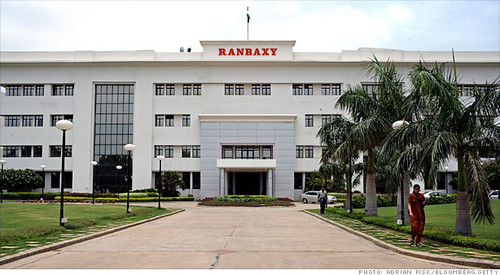
A generic drug company, Ranbaxy, based in India. The firm has been under scrutiny for circulating counterfeit pharmaceuticals., a photo by Pan-African News Wire File Photos on Flickr.
Former employee approached generic drug maker with fraud suspicions
By John Miller, Laura Strickler, Josh Gaynor
Katherine Eban Blog on the history of the generic drug crisis:
http://features.blogs.fortune.cnn.com/2013/05/15/ranbaxy-fraud-lipitor/
(CBS News) Forty percent of America's drugs are now made overseas in countries like India, where oversight is limited. In the U.S., the Food and Drug Administration has one inspector for every nine factories. In India, it's one for every 105, and drug companies are given days, even months, notice before an inspection.
One Indian company, Ranbaxy, pleaded guilty to selling adulterated drugs in the U.S. Generic drug companies like Ranbaxy have to prove their drugs have the same effect as the brand name. That's called bioequivalence.
"Unless that product is, in fact, bioequivalent to the branded product, you might not be getting what you're bargaining for," says Dr. Kathy Spreen, who was hired by Ranbaxy in 2004 to help the company comply with FDA regulations.
Spreen became alarmed when inspecting bioequivalence data for a Ranbaxy diabetes drug.
"The data from the generic and the brand were identical," Spreen says. "Any time you see perfect data, you're probably looking at false data or inaccurate data or made-up data. I started asking, 'I need the data. I need the initial raw data.'"
Ranbaxy whistleblower reveals how he exposed massive pharmaceutical fraud
FDA stops 11 Indian-made drugs from entering U.S.
But Spreen says she could not get it.
When she found out what Ranbaxy was doing, she went right to the top, to Ranbaxy's billionaire CEO, Malvinder Singh.
"He held my hand and he told me to just be patient and everything would be taken care of," Spreen says.
But she says nothing was done.
Dinesh Thakur, a former Ranbaxy executive, blew the whistle on the company to U.S. authorities who quickly launched a criminal investigation. Thakur found bioequivalence data either didn't exist or was made up altogether.
"When you find a blood sample rework for one patient copied 23 times because there are 24 patients needed to prove bioequivalence, that's not an error," Thakur says.
In 2008, in the middle of the FDA criminal investigation, Singh sold his majority stake in Ranbaxy to the Japanese firm Daiichi Sankyo. The new owners say the fraud is in the past and they've invested $300 million to retrain employees and upgrade facilities.
Yet the FDA has found new problems with Ranbaxy facilities. CBS News traveled to Ranbaxy's rural Toansa plant in northern India, where Ranbaxy makes the key ingredients that make a drug work.
Despite the manicured grounds and catchy safety slogans, in 2012, Ranbaxy found glass particles in their generic Lipitor and issued a recall.
Later that year, FDA inspectors found the plant failed to investigate manufacturing problems. At the nearby plant in Mohali, the FDA found bathrooms with no running water.
"So you have to ask, did the company learn their lesson, and more importantly, did the FDA learn their lesson?" Spreen says.
Ranbaxy declined CBS News' request for an interview, but in a statement, the company said they are "committed to providing high-quality affordable drugs to patients in the U.S." and "will take all measures to keep ... facilities in full compliance to all regulations."
Just two weeks after CBS News visited Ranbaxy's facilities, the FDA banned a third Ranbaxy plant in India from sending drugs to the U.S. market. Now all of their finished drugs are made in the U.S.
See the observations made by the FDA during September 2012 inspections of Ranbaxy's Mohali plant, below.
No comments:
Post a Comment